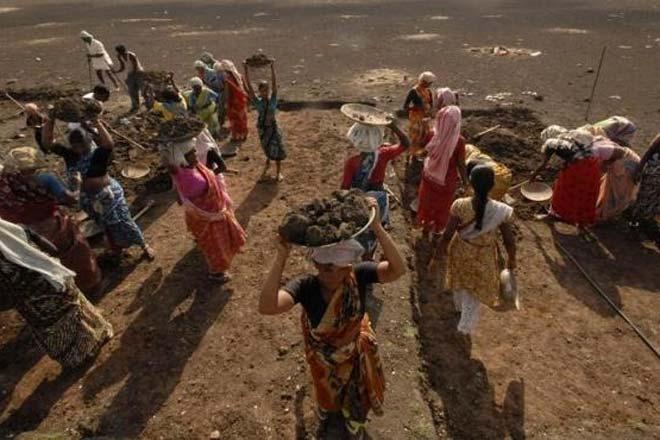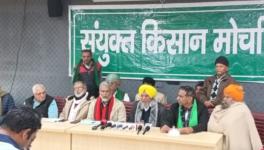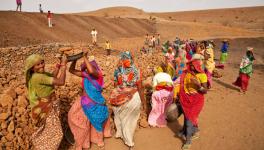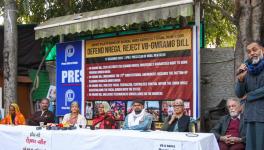Rural Development Minister Made a Mockery of MGNREGA, Says Activist Group

Image Courtesy: The Financial Express
New Delhi: The NREGA Sangharsh Morcha, a collective of rights organisations and individuals, has expressed dismay at the statement by Rural Development Minister Narendra Singh Tomar in Parliament recently.
In a statement, the committee, while welcoming a nine-hour discussion in the House, said the minister had displayed a “lack of understanding” of the issue and accused him of presenting “misleading” figures when asked about the inadequacy of funds for MGNREGA. Tomar said the budget allocation for the scheme has been regularly increased, a statement that the activists have termed as an “outright lie.”
Below is the full statement of the NREGA Sangharsh Committee.
While it is heartening that a discussion on rural development lasted for nine hours in Parliament with important issues on MGNREGA being raised, we are deeply disappointed at the statement of the Rural Development Minister that not only displays a lack of understanding of the program but also betrays the clear anti-poor sentiment of this government.
On the central issue of inadequate funds which several MPs raised and NREGA workers and citizens groups have been consistently demanding for years, the minister responded by first simply citing a cumulative budget amount between 2014 and 2019 comparing it to the period between 2008 and 2013. These figures are meaningless because they do not give people a sense of the real decline in MGNREGA allocation. The Minister then went to on to say that this government has regularly increased the budget allocation for MGNREGA. This is an outright lie on the floor of the house. In fact the minister himself presented the figures of Rs 55,000 crore in 2017-18, followed by Rs 61,084 crore in 2018-19 and Rs 60,000 crore in 2019-20. By his own figures, the budget allocation for MGNREGA in this financial year (Rs 60,000 crore) is less than that of the previous year (Rs 61,084 crore).
Moreover, with pending liabilities mounting at the end of the every financial cycle (20-35% of budget allocation) and inflation increasing every year, both incontrovertible facts, even a seemingly small decrease in the allocation for the program brings implementation to a grinding halt on the ground. The dismissal of the demand for higher allocation for the program without any acknowledgement of this reality and presenting inaccurate figures demonstrates the intent of this government to continue to choke funds to MGNREGA while misleading the public and elected representatives alike.
Second, the minister announced that 99% of MGNREGA payments are going into workers accounts. While this is true, the payment to bank accounts has nothing to do with the work of this government. The shift from cash to bank accounts dates back to 2010. What the minister refused to address is the issue of delayed payments linked to the non-availability of timely funds which has strangled the program and adversely affected the lives of millions of workers. Also, the minister seems to be ignorant about the fact that the payments are still routinely delayed and the AADHAR based payments through the fragile rural banking systems have further added to the plight of the workers.
Rightfully acknowledging the role of MGNREGA in providing alternative employment across rural India, the Minister cited official figures of 268 crore persondays provided in 2018-19 of which a little over half the share of employment went to women (55%). However, activists and researchers have been pointing out for years that MGNREGA is functioning far below its potential. The Minister however seems unaware of this reality because according to him 52% of households that have worked under the program have been employed for a 100 days. This figure is nothing but fiction. Never in the history of MGNREGA, have more than 10% of households received the full 100 days of guaranteed employment and average days of employment has not gone beyond 51.
After the presentation of these grossly misleading figures, followed a bizarre statement where the Minister said that he is not in favour of the continuation of NREGA because it is a program designed for the poor and this government is committed to eliminating poverty. We condemn this statement on two counts. First, MGNREGA is an act of Parliament with constitutional backing and is not subject to the whims and beliefs of individual ministers that come and go. Secondly, the statement reveals an anti-poor bias of this government which seems to be more interested in “eliminating” the poor rather that addressing the complex issues of poverty and inequality that rural India continue to face in 2019. This statement also reveals a complete lack of understanding of the role MGNREGA has played in addressing rural poverty.
There is now ample evidence to show that MGNREGA has served as a lifeline for the rural poor with one out of every three households having worked under the program since its inception. Just as one example, according to the NCAER report, at least 25% of the decline in poverty since 2004-05 for participating households can be attributed to MGNREGA.
The NREGA Sangharsh Morcha feels that while in the current context strengthening MGNREGA is the need of the hour, the union minister’s statement at the floor of parliament, expose Bharatiya Janata Party’s anti-poor bias.
Last year, the average increase in MGNREGA wages across the country is a measly 2.6%. At a time when large parts of the country are experiencing yet another drought, unemployment is at a historical high and the poor are still recovering from 2016’s demonetisation which crippled the informal economy and led to job-losses for millions across the country, rural wages remain stagnant.
The Supreme Court has repeatedly upheld minimum wages as a fundamental right and equated payment of anything less as “forced labour”. Un-remunerative NREGA wages, coupled with long delays in wage payments – even non-payment of wages in many cases – has turned many rural workers away from the employment guarantee programme.
For 33 states and Union Territories the NREGA wage rate is less than the corresponding minimum wage for agriculture, condemning its employment guarantee act workers to another year of bonded labour.
NREGA Sangharsh Morcha strongly condemns this anti-worker decision and demands an increase in the NREGA wage rate to Rs 600 a day. This follows the Seventh Pay Commission recommendation of Rs 18,000 as the minimum monthly salary.
Get the latest reports & analysis with people's perspective on Protests, movements & deep analytical videos, discussions of the current affairs in your Telegram app. Subscribe to NewsClick's Telegram channel & get Real-Time updates on stories, as they get published on our website.
























